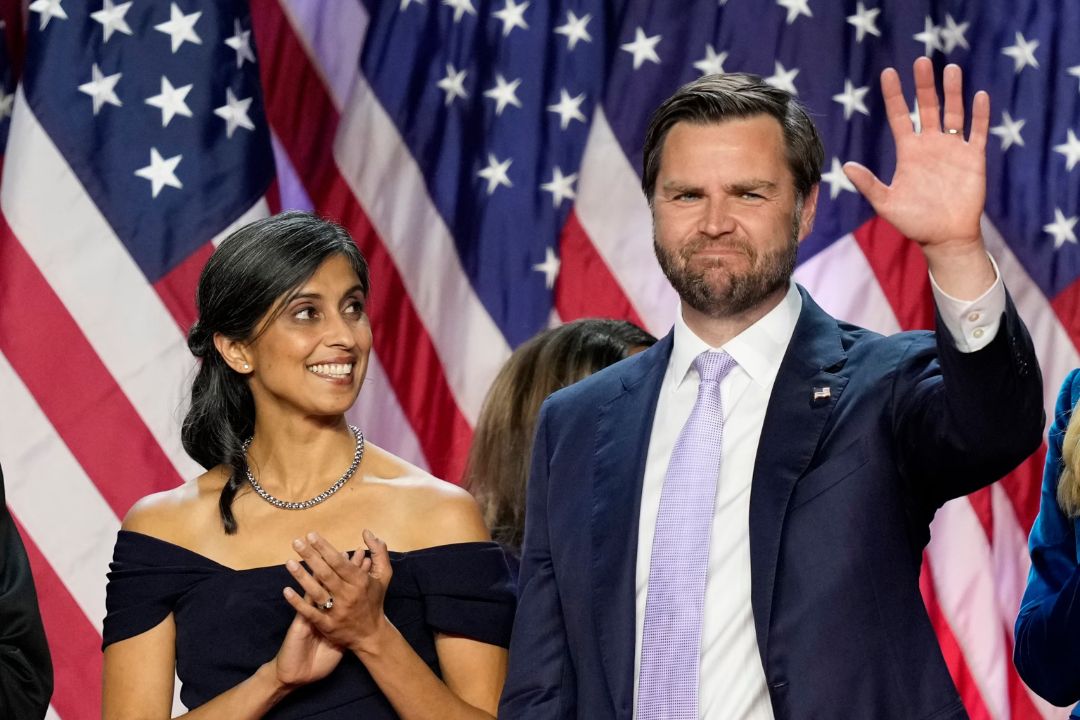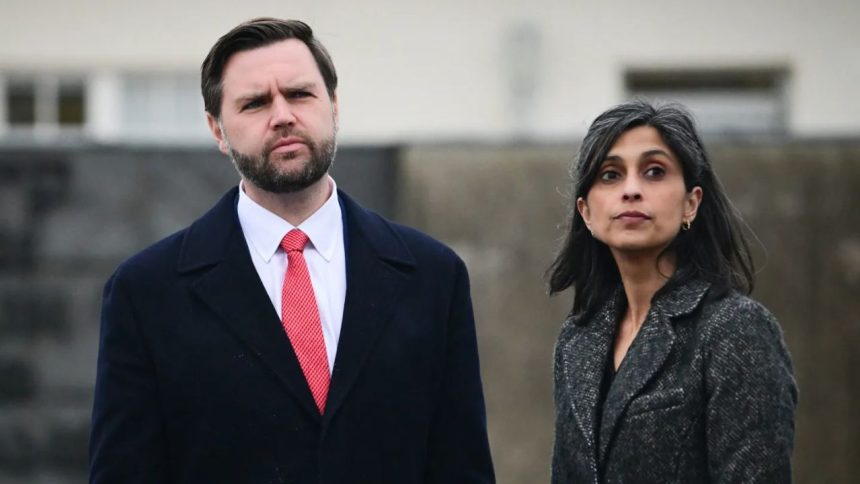JD Vance’s journey into Catholicism is a story of personal transformation, intellectual curiosity, and family influence. Born James Donald Bowman in 1984 in Middletown, Ohio, Vance grew up in a turbulent household where religion was present but inconsistent. His mother struggled with addiction, and his grandparents, who helped raise him, had a loose connection to Protestantism.
As a teenager, Vance briefly attended a Pentecostal church with his biological father, Don Bowman, where he absorbed end-times beliefs, including the idea that the world might end in 2007. That didn’t happen, of course, and by the time he enlisted in the Marine Corps after high school, Vance had drifted away from organized religion entirely. He even identified as an atheist for a period, a stance that shifted when he began studying philosophy and law.
JD Vance Is a Catholic Convert, but His Wife, Usha Vance’s Religion Is Hinduism
The turning point for Vance came during his time at Yale Law School, where he met his future wife, Usha Chilukuri, a fellow student raised in a Hindu Telugu Brahmin family. Though Usha did not push him toward any particular faith, their conversations about morality, justice, and meaning rekindled his interest in spirituality. Vance started reading theologians like St. Augustine and modern thinkers such as René Girard, whose ideas about mimetic desire and sacrificial violence resonated with him.

He also engaged with Dominican friars, including Father Jonathan Wilson of the St. Joseph Province, who played a key role in his eventual conversion. On August 17, 2019, Vance was formally received into the Catholic Church at Holy Name Church in Cincinnati, Ohio, with Father Wilson baptizing him. He chose St. Augustine as his confirmation saint, a nod to the theologian’s own dramatic conversion story.
Vance’s faith is not just a personal belief system but a driving force in his political career. He aligns himself with the “postliberal” movement, which rejects secular liberalism in favor of a society structured around traditional Christian values. This worldview informs his hardline stances on issues like abortion, where he supports a federal ban after six weeks, and gender ideology, which he has called a “cultural sickness.”
In 2022, during his Senate campaign, he openly criticized Pope Francis for the pontiff’s progressive views on immigration, arguing that such teaching permits prioritizing the needs of citizens over migrants. This put him at odds with many mainstream leaders but endeared him to right-wing folks who see the Pope as too liberal. Vance has also advocated for policies like banning p****graphy, which he views as a moral crisis, and expanding school choice to favor religious education.
Usha Vance, despite not converting to Catholicism, has been a supportive figure in her husband’s spiritual life. The two married in 2014 in a civil ceremony, long before his baptism, and their interfaith dynamic has drawn both curiosity and criticism. Usha, a successful litigator at Munger, Tolles & Olson, continues to practice Hinduism but attends Mass with Vance and their three children every Sunday. Vance has joked about feeling guilty for “dragging her to church,” acknowledging that she didn’t sign up for this when they first got together.
Still, Usha has described his conversion as “good for his soul,” even if it hasn’t led her to abandon her own faith. Their arrangement showcases a modern, pluralistic approach to marriage, though it hasn’t shielded them from backlash. Some conservative Catholics have questioned Vance’s commitment to orthodoxy given his Hindu wife, while Hindu nationalists have accused him of disrespecting her beliefs.
Today I met with the Holy Father Pope Francis. I am grateful for his invitation to meet, and I pray for his good health.
Happy Easter! pic.twitter.com/SIhU9gYQl2
— Vice President JD Vance (@VP) April 20, 2025
The Vances’ religious life is also intertwined with their public image. During his 2022 Senate run, opponents tried to paint Vance as a hypocrite for championing Christian values while being married to a non-Christian. He pushed back, framing his family as proof that traditional values can coexist with diversity. Meanwhile, Usha has faced Hinduphobic attacks online, including false claims that she pressured Vance into converting to Hinduism.
In reality, she has been a quiet but steady presence in his spiritual evolution, even if she hasn’t followed him into the Church. Their children are being raised Catholic, a decision Usha supports, though it’s unclear how much Hindu tradition will be passed down to them.
JD Vance’s faith has only deepened since entering politics. He frequently references social teaching in speeches, framing economic policy through the lens of subsidiarity and solidarity. He has also become a vocal critic of what he calls “woke capitalism,” arguing that corporations have abandoned moral responsibility in favor of progressive activism. This stance has won him fans among conservatives who see him as a rare politician willing to merge theology with policy. At the same time, his hardline positions have alienated more moderate believers, including some who accuse him of weaponizing religion for political gain.



